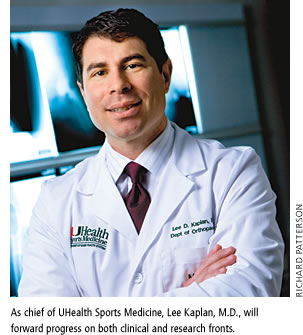 For Lee Kaplan, M.D., being named chief of UHealth Sports Medicine is a homecoming of sorts. Kaplan grew up in South Florida and did his residency in orthopaedics at the University of Miami/Jackson Memorial, followed by a sports medicine fellowship at the University of Pittsburgh. After spending the past six years as assistant professor of orthopaedics and rehabilitation at the University of Wisconsin-Madison School of Medicine, he knows what it takes to get injured athletes back in the game. For Lee Kaplan, M.D., being named chief of UHealth Sports Medicine is a homecoming of sorts. Kaplan grew up in South Florida and did his residency in orthopaedics at the University of Miami/Jackson Memorial, followed by a sports medicine fellowship at the University of Pittsburgh. After spending the past six years as assistant professor of orthopaedics and rehabilitation at the University of Wisconsin-Madison School of Medicine, he knows what it takes to get injured athletes back in the game.
“I was presented with a unique opportunity to return to the Miller School and help build a premier academic-based sports medicine program,” says Kaplan. “And at the same time get to be close to family in South Florida, so it was clearly a win-win situation.”
With access to top physicians and researchers across a number of departments, the Division of Sports Medicine has a clear competitive edge. “Sports medicine requires an integrated approach, with professionals across a variety of disciplines working together as a team,” says Kaplan. “Our plan is to involve everyone from primary care physicians, surgeons, and neurologists to physical therapists, athletic trainers, and nutritionists, and that’s something no one else in South Florida can offer.”
Research will also be a critical component for Kaplan, who along with others is actively researching causes and cures for a wide variety of sports-related injuries. Their research is translating into clinical advances through improved patient care and on the playing field through improved training, performance, and injury prevention.
As the official doctors for the University of Miami Hurricanes, the sports medicine team will work closely with all of UM’s athletic teams. But UM student athletes won’t be the only ones to benefit from UHealth Sports Medicine.
“Anyone with an injury or medical condition affecting their ability to exercise, participate in sports, or maintain an active lifestyle is a candidate for our service,” Kaplan says. “Because of our climate, people here are more active, and we hope to help them continue to do whatever activity they enjoy.”
|


